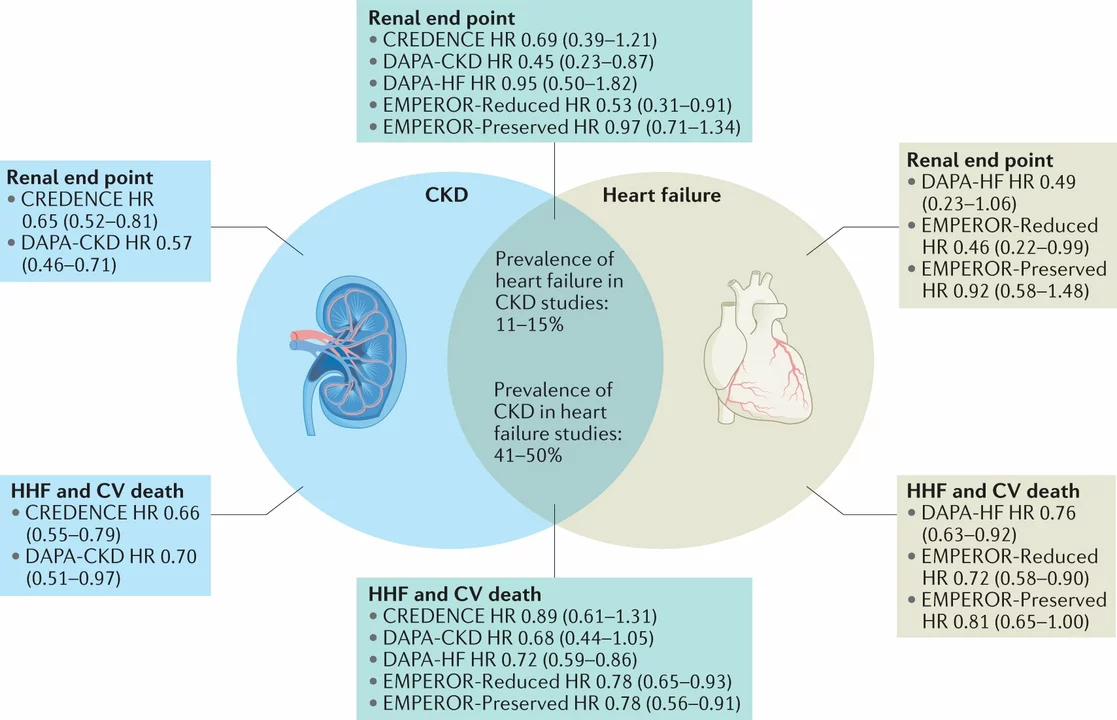Heart Failure Management: Practical Steps You Can Start Today
Heart failure can feel scary, but small, steady habits make a big difference. This page gives straightforward steps you can use right away: what to watch for, how to manage medicines, simple diet and activity tips, and clear signals to call your doctor.
Medications and daily checks
Most people with heart failure stay stable on a mix of drugs: ACE inhibitors or ARBs, beta-blockers, diuretics, MRAs, and newer meds like SGLT2 inhibitors. Stick to the schedule your clinician gave you. If a pill makes you dizzy or causes bad side effects, call them instead of stopping suddenly.
Check your weight every morning after using the bathroom, wearing similar clothes. A gain of 2–3 pounds in 24 hours or 5 pounds in a week often means fluid is building up. Track swelling in your ankles, belly, or abdomen and note if breathing gets harder when lying down.
Lifestyle: food, fluid, and activity that help
Cutting sodium helps most people. Aim for about 1,500–2,000 mg of sodium a day if your doctor recommends it—avoid adding salt and read labels for canned foods and sauces. If your clinician advises fluid limits, stick to that; many people with advanced symptoms limit to 1.5–2 liters per day.
Keep moving. A daily walk or light home exercises improve stamina and mood. Don’t push to exhaustion; short, regular sessions beat rare long workouts. Cardiac rehab is worth asking about—it's supervised and builds confidence safely.
Watch alcohol and caffeine. Heavy drinking weakens the heart. If you smoke, get help to quit—your heart will thank you fast.
Vaccines matter. Flu and pneumonia shots reduce the chance of infections that can worsen heart failure. Ask your provider about timing and any other recommended vaccines.
Sleep and rest count. Trouble breathing at night or waking short of breath needs attention—it could signal fluid around the lungs. Treating sleep apnea, if present, often improves symptoms.
Learn your action plan. Many clinics give a written plan that tells you what to do for weight gains, swelling, or shortness of breath—follow it and keep a copy at home.
When to call: sudden weight gain, new or worsening shortness of breath, chest pain, fainting, or swollen belly with nausea. These are red flags—don’t wait.
Devices and procedures: some people need an ICD to prevent dangerous rhythms or a CRT to improve heart pumping. In severe cases, options include transplant or mechanical pumps. Your cardiologist will explain if any of these fit your situation.
Work with your team. Bring a list of meds to visits, ask for clear goals, and involve family or caregivers. Small changes—daily weights, cutting salt, taking meds on time—add up to better days and fewer hospital visits.

The Role of Spironolactone in Heart Failure Management
As a blogger, I've recently come across the importance of Spironolactone in heart failure management. Spironolactone is a diuretic medication that helps in reducing fluid buildup and lowering blood pressure, which are crucial steps in managing heart failure. This medication works by blocking the action of a hormone called aldosterone, which in turn reduces fluid retention and eases the strain on the heart. Studies have shown that adding Spironolactone to the standard treatment for heart failure patients can significantly improve their symptoms and overall quality of life. In summary, Spironolactone plays a vital role in heart failure management, offering patients better symptom control and improved outcomes.
© 2026. All rights reserved.
